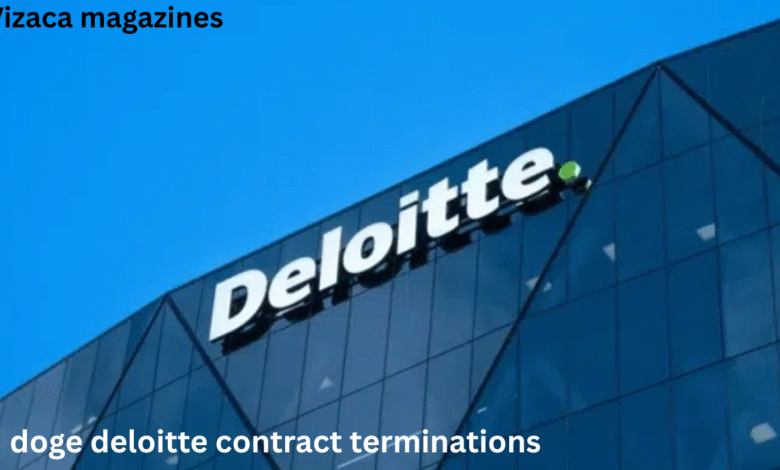Beyond The Standard: Unraveling the Doge Deloitte Contract Terminations??

In recent times, the term “doge deloitte contract terminations“ has taken on an unexpected prominence within corporate, legal, and even digital circles. While both Doge—the term often associated with the meme-based cryptocurrency Dogecoin—and Deloitte—a global leader in financial and advisory services—seem to inhabit vastly different ecosystems, their intersection in contract matters has sparked intrigue and speculation. These doge deloitte contract terminations are not just legal events; they are markers of an evolving business landscape where traditional agreements and digital identities blur.
This article dives deep into what might be “beyond the standard” in the doge deloitte contract terminations?? issue, dissecting possible implications, causes, and consequences within a broader social and economic context.
Understanding the Entities: Doge & Deloitte

Before we analyze the doge deloitte contract terminations, it’s essential to understand who—or what—we are talking about.
Doge, originally a Shiba Inu meme, evolved into a full-fledged cryptocurrency that symbolizes internet culture’s influence on finance. Dogecoin started as a joke but quickly became a movement, with celebrity endorsements and wide adoption in niche communities. While Dogecoin isn’t a corporate entity per se, various blockchain projects, tech initiatives, or marketing partnerships might carry the “Doge” branding.
Deloitte, on the other hand, is one of the “Big Four” accounting and consulting firms, known for its rigorous standards, risk management frameworks, and influential consulting work. Any involvement of Deloitte with anything related to “Doge”—whether in tech advisory, blockchain auditing, or smart contract evaluation—would imply a serious attempt to bridge the traditional financial world with the new digital frontier.
This contrast—between Doge’s meme-like cultural power and Deloitte’s corporate rigidity—makes any doge deloitte contract terminations a potent point of investigation.
The Core Question: Why the Terminations??

If there were actual doge deloitte contract terminations, the driving forces behind them would likely revolve around compliance, scope mismatches, regulatory pressure, reputational risk, or technological misalignment.
Compliance Conflicts
Deloitte, operating under strict national and international regulatory codes, might have found certain “Doge”-branded projects non-compliant or incompatible with their frameworks. Even if Doge was part of a decentralized project or DAO, Deloitte could be subject to due diligence procedures that made continuation untenable.
Scope or Misrepresentation
Another plausible angle in the doge deloitte contract terminations?? discussion is misalignment between initial project expectations and the actual technical, legal, or financial scope. If a project using Doge branding failed to meet outlined objectives—or inflated its impact—Deloitte could have chosen to walk away professionally.
Reputational Risk
Despite the growing legitimacy of crypto, traditional firms like Deloitte still tread carefully. A contract with a “Doge” brand, no matter how serious the project, might come with inherent risk. Whether it’s media backlash, regulatory suspicion, or internal ethical concerns, reputational safeguarding could be a critical factor.
Beyond the Standard A Cultural Clash

The phrase “beyond the standard” becomes key here. Doge deloitte contract terminations are not just a technical breakdown of obligations. They are emblematic of a wider clash—between the decentralized, humorous, fast-paced culture of crypto, and the slow, formal, rules-based traditions of big consulting firms.
On one side, Doge represents disruption, virality, and community-driven growth. On the other, Deloitte stands for institutionalism, reliability, and long-term risk control. When these two worlds collide in contractual frameworks, it’s not surprising that something breaks—or gets terminated.
If the terminations occurred, they could very well have stemmed from an inability to integrate such wildly different operating philosophies. The termination might not reflect malice or incompetence, but a realization that these two visions of the future weren’t ready to co-exist in the same space—yet.
Potential Scenarios Behind the Curtain
While details on doge deloitte contract terminations remain speculative in public discourse, several hypothetical situations could explain such events:
Blockchain Audits Gone Wrong
If Deloitte had been hired to audit a Doge-based blockchain or protocol, and discovered issues such as unaudited smart contracts, lack of security protocols, or manipulated on-chain data, contract termination might be the ethical and professional route.
Public Relations Backlash
Suppose the internet or stakeholders reacted negatively to the association of Deloitte with a Doge-affiliated group. In that case, contract terminations could be a strategic move to contain reputational damage—especially if controversial memes or community behaviors became headlines.
Regulatory Ambiguity
As governments around the world continue to draft and revise crypto regulations, Deloitte might have decided the legal gray areas involving Doge-related entities posed too much long-term exposure. Rather than wait for penalties, they might choose exit.
Internal Policy Shifts
Contract terminations may not stem from a problem with the Doge side at all. Internal reshuffling, new leadership, or adjusted compliance frameworks within Deloitte could render past agreements unfeasible.
Broader Implications of the Terminations
The doge deloitte contract terminations?? matter represents a case study in how the corporate world is trying—and sometimes failing—to engage with the decentralized digital economy. The implications stretch far beyond these two entities.
Contracts Must Evolve
Traditional corporate contracts are not always equipped to deal with decentralized platforms, anonymous contributors, and fluid governance structures. These terminations might signal a need for new contract templates that reflect modern project realities.
Risk Perception in Crypto Partnerships
Major firms may grow even more cautious when engaging with crypto-related brands—especially those perceived as “meme” or non-traditional. Future partnerships may come with stricter vetting and escape clauses.
Cultural Literacy Gap
There’s still a deep gap in understanding between the tech-native, often anarchic crypto culture and traditional firms. These gaps lead to miscommunication, misaligned expectations, and eventual fallout.
Stakeholder Trust
When contracts are terminated prematurely—especially in high-visibility collaborations—stakeholders suffer. Investors, developers, community members, and even regulators may lose trust in the process or the parties involved.
Conclusion: A Future Still Possible?
It’s a narrative filled with irony, complexity, and yet, a kind of poetic inevitability. Doge and Deloitte stand as metaphors for the old world and the new. Their attempt to collaborate—if it indeed happened—was ambitious. That it may have ended in contract terminations isn’t failure; it’s a data point on a larger journey.
The future may still see bridges built between such forces. But that future will require better language, deeper mutual understanding, and new forms of contract and commitment—beyond the standard.
FAQs
1. What are the doge deloitte contract terminations??
The phrase refers to the possible termination of contractual agreements between Deloitte and any Doge-branded or Doge-associated projects. These terminations are speculative but have become a subject of online discourse.
2. Why would Deloitte terminate a contract with a Doge-related entity?
Possible reasons include compliance concerns, reputational risks, legal ambiguities, or misaligned project scopes.
3. Does this mean Deloitte no longer supports blockchain or crypto projects?
Not necessarily. Deloitte continues to work with blockchain technology, but it may be more selective, especially regarding meme-associated or decentralized entities.
4. Is Doge responsible for the contract terminations??
It’s difficult to assign blame without specific documentation. The terminations likely result from mutual disagreements or shifts in corporate policy.
5. What does “Beyond The Standard” mean in this context?
It reflects how traditional business models and legal contracts are being challenged by emerging technologies and cultures, such as those represented by Dogecoin. It emphasizes the need for innovation in understanding and collaboration.




